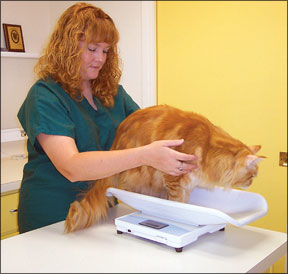You hear a familiar retching sound in the kitchen. Striker is vomiting up his dinner again. As you walk downstairs to clean up the mess, you wonder if its just hair balls – or something more serious that requires a trip to the veterinarians office. Cats vomit for numerous reasons, ranging from benign dietary indiscretion to potentially fatal systemic diseases such as renal Bev Caldwell 288 failure or hyperthyroidism. The experts say that cat owners should pay close attention to a cat that regularly becomes sick to his or her stomach. Be Observant. “When it comes to vomiting, the important concept for cat owners is observation,” advises Fred Scott, DVM, PhD, interim director of Cornells Feline Health Center. “Vomiting in association with signs of systemic illness must be addressed rapidly.” Signs include lethargy, fever, loss of appetite or weight loss. Even if the cause of vomiting is transient or self-limiting, loss of fluids and electrolytes can have life-threatening consequences. There are two major categories of vomiting: acute and chronic. Acute vomiting is sudden onset behavior that appears quickly and can disappear just as fast. If vomiting lasts more than a week or so, it is labeled chronic. Chronic vomiting is often the result of a serious underlying problem. Therefore, you should contact your veterinarian if your cat continues to throw up day after day. Here are the eight most common causes: Gastric/Intestinal: 
Intra-abdominal (nongastric/nonintestinal): This can be caused by disease of abdominal organs such as the liver, pancreas or peritoneum (the thin membrane that lines the abdominal cavity and covers the internal organs), or by urinary tract obstruction.
Metabolic/endocrine:
This type of vomiting often reflects a serious underlying problem such as liver failure, kidney failure, diabetes mellitus, hyperthyroidism or hypercalcemia.Drug reaction:
Vomiting is one of the potential adverse reactions to many types of drugs. Never give your cat drugs unless advised by a veterinarian. If you notice a sudden onset of vomiting after starting a regimen of a medication, alert your veterinarian right away.Toxins:
Vomiting can be an indication that your cat has ingested poisons or toxins, such as a toxic houseplant or antifreeze.Diet:
A change of diet can cause sudden vomiting. Intolerance or hypersensitivity to certain foods can also trigger vomiting.Neurological:
Cats can get motion sickness, just like us. Other more serious neurological causes of vomiting include encephalitis and neoplasia (tumors).Infections:
Vomiting can be caused by several serious diseases such as panleukopenia (feline parvovirus infection), feline immunodeficiency virus (FIV) infection; feline leukemia virus (FeLV) infection, salmonellosis and heartworm infection.If you observe your cat vomiting, you should keep an eye on his subsequent behavior. Be particularly careful to note any other signs that accompany the vomiting and share them with your cats veterinarian.



